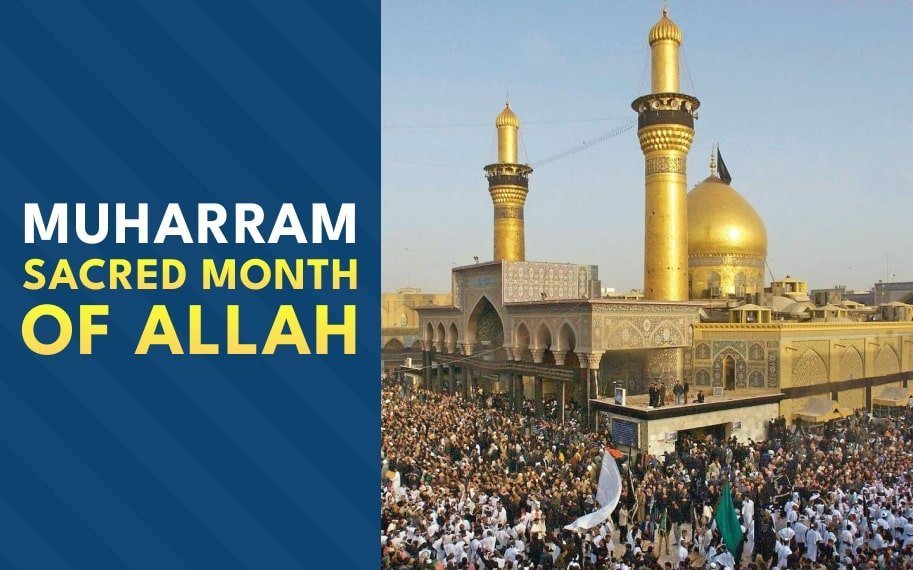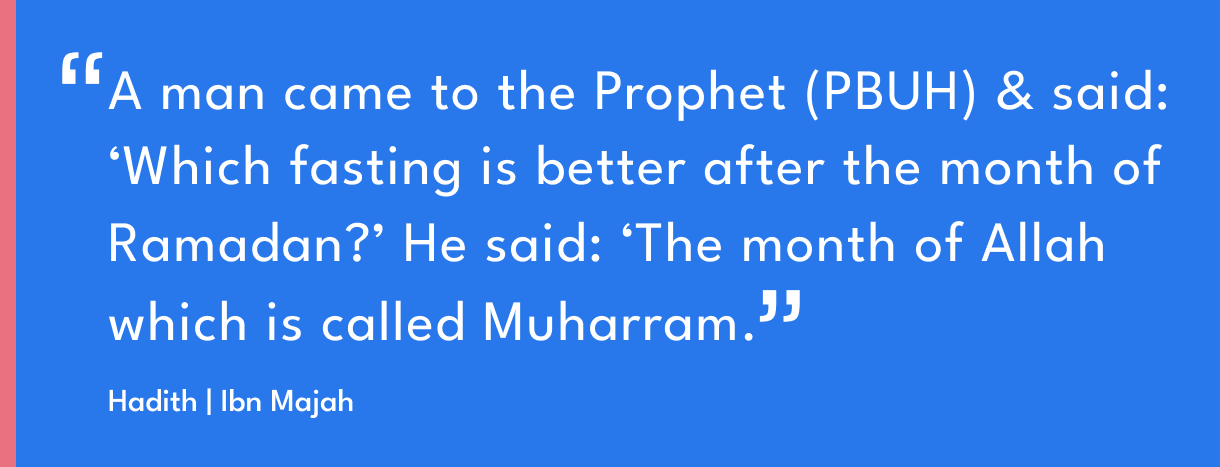
Muharram is the first month of the Islamic lunar calendar, holding significance as a sacred month in Islamic tradition. While it’s not explicitly termed the “sacred month of Allah” in the Quran, it is part of the quartet of sacred months mentioned in Surah At-Tawbah (9:36).
Table of Contents
Virtues of the Month of Muharram
The month of Muharram holds several virtues and blessings in Islamic tradition. Some of the virtues of Muharram are as follows:
- Sacredness and Favor of Allah:
- One of the four sacred months in Islam, denoting its significance and Allah’s favor upon it.
- Engaging in good deeds during Muharram is believed to yield increased rewards from Allah.
- Fasting on Ashura:
- Fasting on the 10th day of Muharram (Ashura) is recommended by Prophet Muhammad.
- It’s an act of seeking forgiveness and purifying oneself spiritually.
- Reflection and Repentance:
- Muharram is a time for introspection, self-assessment, and seeking forgiveness from Allah.
- Commemorating Imam Hussein’s Martyrdom:
- Particularly significant for Shia Muslims, commemorating the sacrifice of Imam Hussein at Karbala.
- Emphasizes principles of justice, bravery, and standing against oppression.
- New Beginnings and Renewal:
- Marks the Islamic New Year, symbolizing a fresh start and renewed commitment to faith.
- Seeking Allah’s Blessings:
- Increased prayers, supplications, and seeking Allah’s mercy and guidance during Muharram.
- Promotion of Peace and Unity:
- Encouragement to maintain peace, avoid conflicts, and foster unity among Muslims in this sacred month.
Events in the Month of Muharram
The month of Muharram in the Islamic calendar holds historical and religious significance, marked by several key events:
Event of Karbala
The Event of Karbala is one of the most significant occurrences in the Islamic calendar, particularly for Shia Muslims. It revolves around the tragic incident of the Battle of Karbala, which took place on the 10th day of Muharram in the year 680 AD. This battle resulted in the martyrdom of Imam Hussain ibn Ali, the grandson of Prophet Muhammad, along with his family members and companions. Imam Hussain stood against the Umayyad ruler Yazid’s unjust rule, seeking to uphold principles of justice, righteousness, and resistance against oppression. This event is commemorated annually through mourning rituals and gatherings.
Ashura – 10th Day of Muharram
Ashura, specifically the 10th day of Muharram, holds multifaceted significance for Muslims:
- Sunnis: Commemorate the day as a time when Prophet Moses (Musa) fasted in gratitude for the liberation of the Israelites from Egypt.
- Shias: Observe it as a day of mourning and remembrance for the martyrdom of Imam Hussain and his companions at the Battle of Karbala. Shia Muslims participate in mourning processions, gatherings, and recitations of elegies to honor Imam Hussain’s sacrifice.
Hijra – Migration of Prophet Muhammad (SAW)
The Hijra, or migration of Prophet Muhammad (SAW) from Mecca to Medina, took place in the month of Muharram. In Islamic history, it marks the beginning of the Islamic lunar calendar and is a pivotal event in the life of Prophet Muhammad. Facing persecution in Mecca, Prophet Muhammad and his followers migrated to Medina in 622 AD. This migration (Hijra) holds great significance as it established the first Muslim community in Medina and marked the start of a new era for Islam. Muslims often reflect on the lessons of resilience, faith, and community-building from this event during the month of Muharram.
What to do in the month of Muharram?
During the month of Muharram, Muslims engage in various practices that hold spiritual significance. Here’s what individuals often do during this sacred month:
1. Fasting:
- Ashura Fasting: Some Muslims fast on the 10th day of Muharram (Ashura) as recommended by Prophet Muhammad. This voluntary fast is observed to seek blessings, forgiveness, and spiritual purification.
2. Reflection and Repentance:
- Self-Reflection: Use this time for introspection, evaluating one’s actions, and seeking forgiveness from Allah.
- Repentance: Engage in acts of repentance by acknowledging mistakes and resolving to improve spiritually.
3. Increased Acts of Worship:
- Additional Prayers and Supplications: Increase prayers, recitations of the Quran, and supplications seeking Allah’s mercy, guidance, and blessings.
- Charity and Good Deeds: Increase acts of charity and kindness towards others, focusing on helping those in need.
4. Commemorating Imam Hussein:
- Majalis (Gatherings): Attend or organize gatherings (Majalis) to remember the sacrifices of Imam Hussein and his companions at the Battle of Karbala.
- Recitation of Elegies and Sermons: Listen to or participate in the recitation of elegies and sermons that recount the events of Karbala.
5. Avoiding Conflict and Promoting Peace:
- Maintain Peace: This month emphasizes peace, unity, and avoiding conflicts within the Muslim community and beyond.
6. Learning and Understanding:
- Studying Islamic History: Learn about the historical events associated with Muharram, especially the significance of the Hijra and the events of Karbala.
7. Acts of Remembrance and Duas (Supplications):
- Recite Duas: Engage in supplications, seeking Allah’s blessings, guidance, and forgiveness for oneself and the entire Muslim community.
Engaging in these practices during Muharram fosters spiritual growth, remembrance of historical events, and a deeper connection to Islamic teachings centered around sacrifice, justice, and devotion.

The Message of Muharram for the Muslim Community
The message of Muharram carries profound significance for the Muslim community, resonating with essential values and lessons. Here are the key messages that Muharram communicates:
1. Sacrifice and Commitment to Truth:
- Stand for Justice: The sacrifice of Imam Hussein at Karbala embodies the steadfastness in standing against oppression and tyranny, upholding truth and justice at all costs.
- Commitment to Principles: Muharram teaches the importance of staying true to principles, even in the face of adversity.
2. Unity and Compassion:
- Fostering Unity: Muharram emphasizes unity within the Muslim community, transcending differences in beliefs and practices.
- Promotion of Compassion: It encourages compassion, kindness, and empathy towards others, reflecting the teachings of Islam.
3. Spiritual Reflection and Self-Improvement:
- Self-Reflection: Use the month for introspection, evaluating one’s actions, seeking forgiveness, and aiming for self-improvement.
- Repentance and Forgiveness: Muharram provides an opportunity for repentance and seeking forgiveness from Allah.
4. Resilience and Faith:
- Resilience in Faith: The events of Karbala showcase the resilience and unwavering faith of Imam Hussein and his companions in the face of adversity.
- Strengthening Faith: Muharram serves as a reminder to strengthen one’s faith and commitment to Allah.
5. Learning and Education:
- Studying History: It encourages learning about Islamic history and understanding the significance of the Hijra, and the sacrifices made at Karbala.
- Passing Down Knowledge: It’s an opportunity to pass down these lessons to younger generations, fostering a deeper understanding of Islamic values.
6. Peace and Avoidance of Conflict:
- Promotion of Peace: Muharram underscores the importance of peace, urging the Muslim community to avoid conflicts and disputes, and fostering harmony instead.
7. Compassionate Action and Charity:
- Acts of Charity: Encourages increased acts of charity and kindness towards others, especially those in need, as a means of embodying the values of compassion and generosity.
The message of Muharram for the Muslim community revolves around standing for truth and justice, fostering unity and compassion, engaging in self-reflection and improvement, and honoring the sacrifices made for noble principles. It serves as a reminder of the core values and teachings of Islam, guiding individuals toward a path of righteousness and spiritual growth.
When is Muharram 2024?
This year, depending on the moon, the month of Muharram is expected to start in the evening of Monday 17th July, with Ashura expected to fall on 27th July.
Conclusion
As Muharram begins, it’s a chance for us to make the most of it. Let’s dedicate our time to worship and doing good things. This special month is a time to focus on Allah, asking for forgiveness and guidance. We can pray more, read the Quran with care, and remember Allah’s greatness. Muharram helps us renew our faith and feel closer to Allah. We should think about our actions, say sorry for our mistakes, and try to be better.
It’s also a time to show kindness and help others. We can reach out to those who need support, lend a hand, and spread happiness in our communities. Muharram is a good moment to show caring and understanding to others. We should also aim to bring Muslims together, despite our differences, and stand united. Every second of Muharram is precious, so let’s not waste it. Instead, let’s do things that bring us closer to Allah and make life better for others.
May Muharram help us grow spiritually, bring us blessings, and strengthen our bond with Allah and our fellow believers. Let’s embrace this time sincerely, knowing that our good actions in this special month hold great rewards.
FAQs
1. What is Muharram?
Muharram is the first month of the Islamic lunar calendar. It holds significance as a sacred month in Islam and marks the beginning of the Islamic year.
2. Why is Muharram significant?
Muharram is important for several reasons. It’s one of the four sacred months in Islam, where certain actions are considered more virtuous. Additionally, it commemorates historical events such as the Hijra (migration) of Prophet Muhammad and the tragedy of Karbala.
3. What is Ashura?
Ashura is the 10th day of Muharram. For Sunni Muslims, it’s a day of fasting commemorating the liberation of the Israelites by Prophet Moses. For Shia Muslims, it’s a day of mourning for the martyrdom of Imam Hussain at the Battle of Karbala.
4. Why do some Muslims fast during Muharram?
Fasting during Muharram, especially on the 9th and 10th days (Ashura), is a recommended practice based on the traditions of Prophet Muhammad. It is a way to seek forgiveness, reflect, and show gratitude.
5. What happened at the Battle of Karbala?
The Battle of Karbala occurred on the 10th day of Muharram in 680 AD. It resulted in the martyrdom of Imam Hussain, the grandson of Prophet Muhammad, and his companions. This event is commemorated by Shia Muslims as a symbol of standing against oppression and upholding principles of justice and faith.
6. How do Muslims commemorate Muharram?
Commemoration varies among Sunni and Shia Muslims. Shia Muslims hold mourning rituals, processions, and gatherings, while Sunni Muslims may fast on Ashura and engage in extra prayers and reflection.
7. Is it obligatory for Muslims to observe Muharram in a specific way?
Observing Muharram isn’t obligatory in a particular manner. However, many Muslims choose to fast, engage in extra prayers, seek forgiveness, and perform acts of charity and kindness during this month.
8. What lessons can be learned from Muharram?
Muharram teaches important lessons about sacrifice, standing against injustice, unity, and the importance of seeking forgiveness and reflecting on one’s actions.
9. Can non-Muslims participate in Muharram commemorations?
Yes, non-Muslims are often welcome to observe and learn about Muharram commemorations. It’s a chance to understand Islamic traditions, history, and the significance of this month to Muslims.
Read Also
Splitting of the Moon – A Divine Miracle
Do Muslims Celebrate Christmas?
Signs of the Day of Judgment (Qiyamah)
The 6 Pillars of Iman (Faith) in Islam

